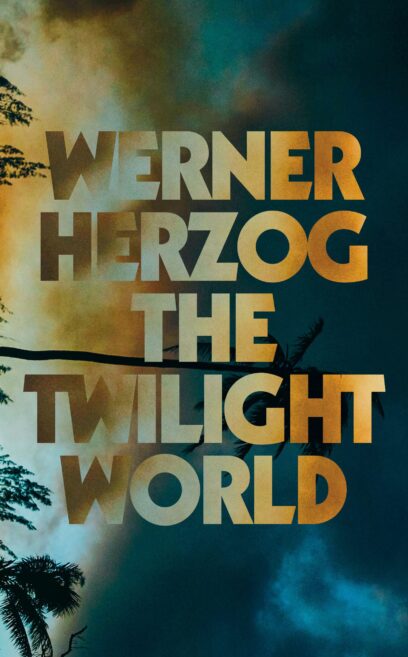 By WERNER HERZOG (Penguin Press; 2021/22)
By WERNER HERZOG (Penguin Press; 2021/22)
The first novel by filmmaker Werner Herzog, whose interest in extreme personalities has resulted in masterworks like EVEN DWARFS STARTED SMALL, AGUIRRE THE WRATH OF GOD and STROZEK, grandiose, visually stunning films about freaks, madmen and eccentrics of all stripes. In THE TWILIGHT WORLD, Herzog relates the story of Hiroo Onoda (1922-2014), a Japanese intelligence officer who following the end of WWII spent 28 years in the Philippine jungle, believing the war was still raging.
“Most details are factually correct; some are not.”
This novel was related in the manner of Herzog’s documentaries, which freely intermix verite and scripted footage. As a note at the beginning of the book states, “Most details are factually correct; some are not. What was important to the author was something other than accuracy, some essence he thought he glimpsed when he encountered the protagonist of this story.”
That encounter takes up a large portion of the first and final pages of THE TWILIGHT WORLD. Herzog claims the book came about due to a 1997 faux pas in which he, in Japan to direct an opera, turned down an audience with the Emperor, a miscalculation “so awful, so catastrophic that I wish to this day that the earth had swallowed me up.” To save face he offered to meet with another iconic Japanese figure, Hiroo Onoda, who told Herzog his story.
Herzog claims the book came about due to a 1997 faux pas in which he, in Japan to direct an opera, turned down an audience with the Emperor, a miscalculation “so awful, so catastrophic that I wish to this day that the earth had swallowed me up.”
Hence the majority of this book, which provides a short but meaty and descriptive history. It begins in February 1974, when Onoda’s jungle hideout was breached by Norio Suzuki, an inquisitive college student with two major aims: to find Onoda and track down the fabled Yeti. Suzuki handily accomplished the first of those goals, but the second (as we learn in the final pages) resulted in his death in the Himalayas. Before that occurs, though, we get an extended flashback to Onoda’s years in the jungle.
The odyssey began in December 1944, when the young Onoda was ordered by his superiors to hold off enemy attacks on Lubang Island in the Philippines. This he committed to, even after the island was overtaken by American soldiers and Onoda was forced into hiding in the wilderness, together with three fellows.
…a sense of ecstatic sensuality that’s quintessentially Herzogian.
Herzog is careful to detail how the men survived by boiling water, distilling palm oil from the flesh of coconuts (to keep their firearms and ammunition in working order), making fire with machine gun powder, building a moveable shelter out of saplings, etc., while Onoda diligently kept time with a calendar of his own invention (with his greatest shock upon being relieved of duty in ‘74 being that his timekeeping was four days off). Also included are plenty of quirky details, such as the finding of a piece of chewed gum (“On closer inspection, and with a little imagination, it is possible to see the imprint of a molar, and beside it that of another tooth, slightly deformed”). Inevitably Onoda’s companions die off, leaving him to fend for himself in an increasingly hallucinatory reality that’s not too divergent from the celebrated imagery of Herzog’s films.
“Onoda’s war,” Herzog writes, “is formed from the union of an imaginary nothing and a dream, but Onoda’s war, sired by nothing, is nevertheless overwhelming, an event extorted from eternity.” This, keep in mind, was translated from Herzog’s native German (by the German born, Florida based poet Michael Hoffman), which couldn’t have been an easy job. Herzog acknowledged as much while speaking to an audience about his earlier nonfiction text OF WALKING IN ICE: “there will be a very, very deep problem in translating this book,” and therefore “I must ask you all to learn German!”
So how does the German-centric TWILIGHT WORLD stack up? Quite well, with a sense of ecstatic sensuality that’s quintessentially Herzogian. In the category of novels by famous directors it ranks pretty high, honoring its creator’s cinematic legacy while heralding a possible alternate career in a different medium.
